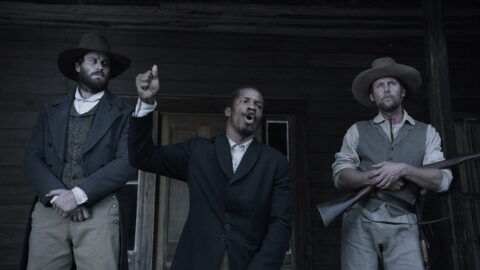Sundance Dispatch #2
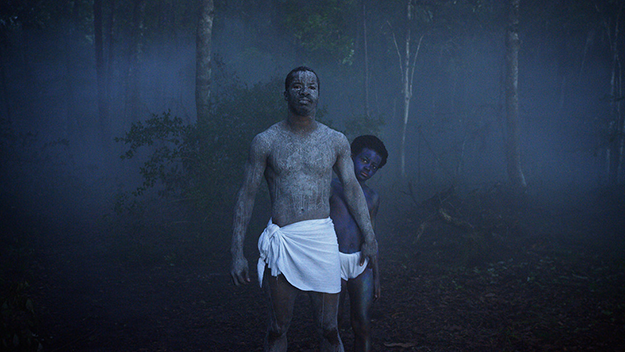
There have certainly been spectacular moments of discovery at the Sundance Film Festival over the past few decades. Early films by Darren Aronofsky, Ava DuVernay, Quentin Tarantino, Bryan Singer, Steven Soderbergh, Kelly Reichardt, Todd Haynes, and many others debuted at the Utah festival, lifting their directors to wider awareness. But rarely does a film cause the sort of stir that Nate Parker’s The Birth of a Nation did earlier this week. In fact, it’s hard to name a film that had a bigger, more raucous, more financially lucrative world premiere here.
The premiere of The Birth of a Nation at the 1,200-seat Eccles Theatre was immediately etched into Sundance history, not only because just hours after the screening ended it was sold for distribution for a record-breaking $17.5 million (to Fox Searchlight), but because of the rapturous reaction at its first showing. Anticipation for the film, a biographical look at Nat Turner who led an 1831 slave rebellion, sparked a standing ovation as Parker took the stage to introduce the unseen film. As the credits rolled, the standing ovation resumed in the dark theater for several minutes and continued again when Parker came back on stage to talk about the movie.
In the days since the debut of The Birth of a Nation, press have swarmed Nate Parker, and the story of the film’s major success at Sundance has become national news. The filmmaker, and his studio distributor, intend to use the awareness to build on a national rollout for the film later this year.
We are in a unique moment for film culture and the Hollywood industry. Pointed criticism over limited opportunities for women in feature filmmaking have intensified, particularly over the past year, and Sundance 2016 began in the wake of sharp criticism of recent Academy Award nominations that failed to recognize key achievements by people of color and LGBTs. AMPAS responded on the second day of Sundance saying it would dramatically improve the makeup of its membership within four years. The move drew praise from those seeking a more representative body and criticism from some older members of the institution. On Sunday afternoon, at a reception hosted by the Academy at the festival, filmmakers and insiders chatted with each other and questioned AMPAS reps about the new initiative.
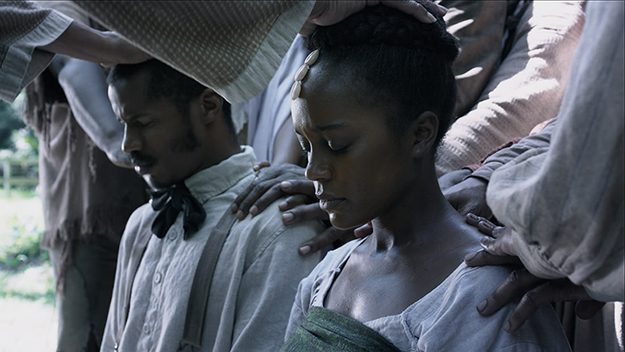
The premiere of The Birth of a Nation, a film that Nate Parker spent seven years developing, writing, and producing, could not have been more perfectly timed. The ovation that greeted him as he introduced the movie was an embrace. Just getting the film this far, the industry seemed to be saying—against so many hurdles—was an achievement.
A historical tale striking brutal, adoring, and vengeful notes, Parker’s The Birth of a Nation details Nat Turner’s life as a literate kid on the plantation and then flashes forward to capture his rise to prominence as a preacher to southern slaves. Parker plays the adult Turner alongside Armie Hammer, Gabriele Union, and Jackie Earle Haley, among others. Turner witnesses the scourge of slavery as he travels to preach to other plantations and soon turns his faith against his people’s oppressors. Observers here quickly branded The Birth of a Nation as a cross between Steve McQueen’s 12 Years a Slave and Mel Gibson’s Braveheart.
Indeed, the film doesn’t spare either the beauty of the South or the brutality of what becomes open war between master and servant.
“I made this film for one reason, with the hope of creating change agents,” Parker told the electrified audience after the first screening ended. The hope was “that people can watch this film and be affected, that you can watch this film and see that there are systems that were in place that were corrupt, and corrupted people. And the legacy of that still lives with us. There are systems in our lives right now, in your environment right now.”
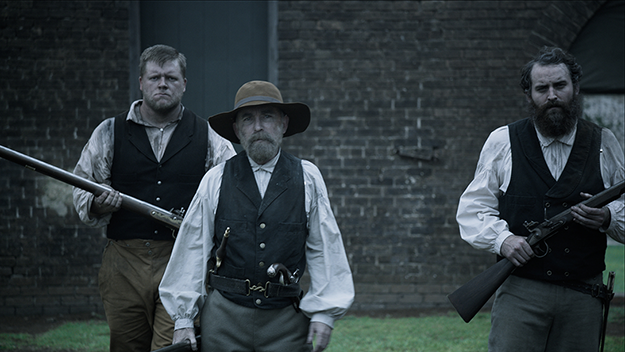
“I just want you,” he added, “if you are affected and if you are so moved, to ask yourself: are there systems in my life that need attention, whether it be racial, whether it be gender, sexual? There are a lot of injustices.”
Parker was clear about his agenda for the film. He said this week that he had aimed “to make a healing mechanism for America.”
An actor seen in Beyond The Lights and Arbitrage, Parker added that in Hollywood he was advised against making The Birth of a Nation, told that the subject matter was bad business, and warned that the film wouldn’t travel overseas because it featured people of color. He put his acting career on hold, funneled his own money into the production, and said that he sacrificed everything that he could to pave the way for this movie.
On Monday, he was clear to link his goals to the challenges currently facing the film culture and the entertainment industry.
“It all speaks back to the original D.W. Griffith,” Parker related. “The original Birth of a Nation is the foundation of our industry. That was it, the first. We’re built on sand in this industry, we just are. And if we don’t give it attention, we’re going to have these issues, this infrastructure, that we have to deal with from generation to generation.”
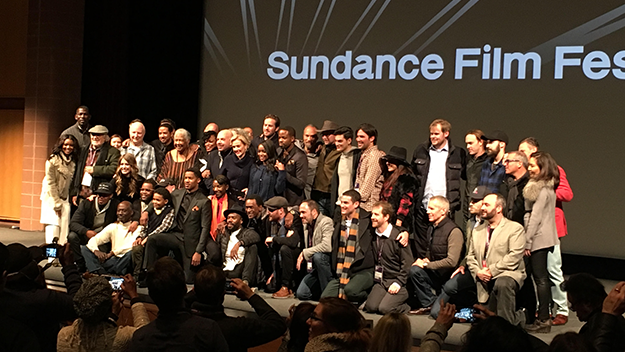
Photo by Eugene Hernandez
Fox Searchlight is still strategizing the release plan for The Birth of a Nation, but trade reports indicate that the studio has committed to a 1,500 screen theatrical rollout later this year. According to Variety, Parker will hit the road and stage discussions in various cities. He aims to use the film to stoke a national conversation about race in this country.
“This is my tool, this is my weapon,” Nate Parker said in a public radio interview this week at Sundance. “Nat Turner used an axe. My axe is a camera, and sound equipment, and an incredible crew.”
On Monday, Parker pulled much of that crew on stage at Sundance’s Eccles Theatre to acknowledge their contributions to the film. Heading out of the festival he and his team are already deploying the hashtag #NatTurnerIsComing to galvanize audiences ahead of this year’s theatrical release.
“What I took from this is that Nat Turner had a riotous disposition towards injustice,” Parker said on Monday. “That developed in him, and he used the tools he had. He didn’t have Twitter or Facebook. If he did, it might have been a different rebellion.”





